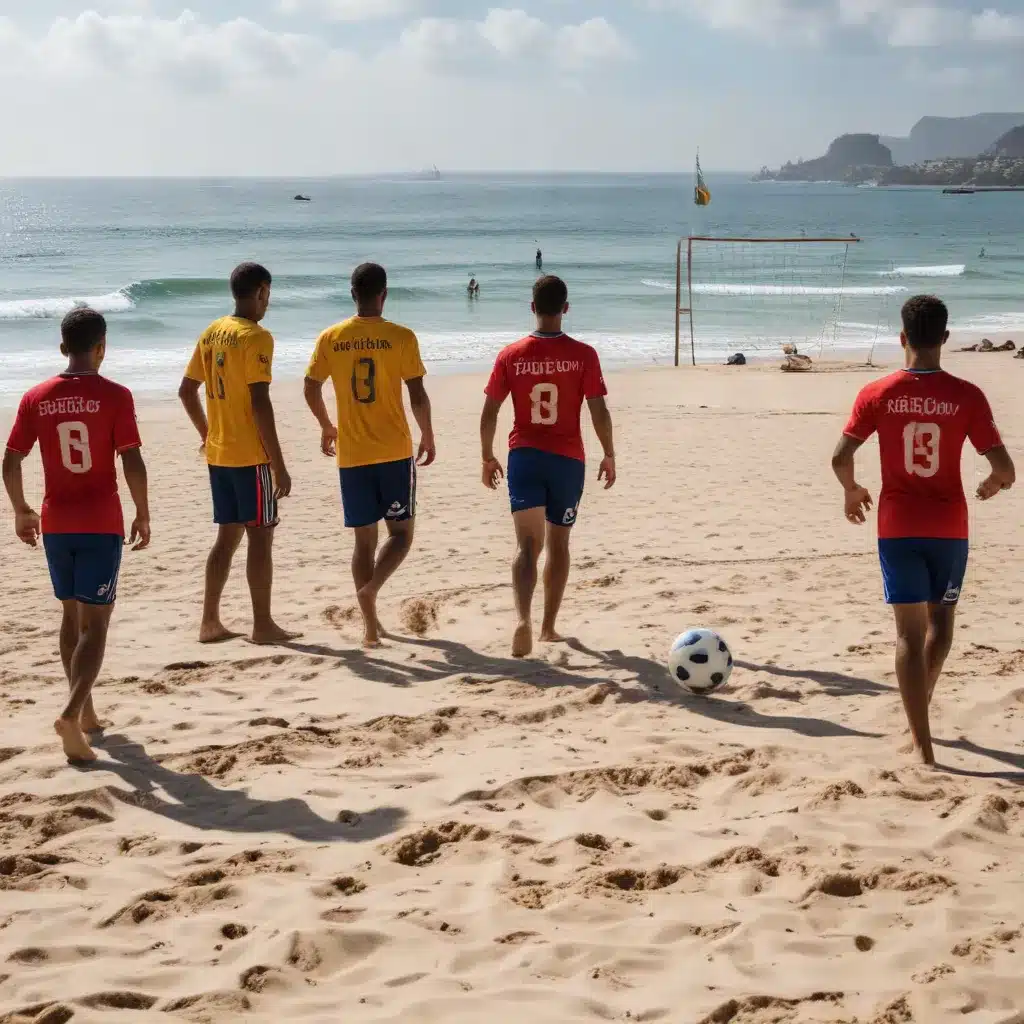
Connecting the Dots: Integrating Beach Soccer into the Fabric of Brazilian Football Ecosystem
Football Culture in Brazil
Football is the undisputed national passion in Brazil. For generations, the sport has been deeply woven into the social fabric, transcending mere entertainment and becoming a unifying force that captivates the imagination of an entire nation. From the sun-drenched beaches of Rio to the bustling metropolises of São Paulo, the rhythmic beats of samba and the collective roar of the torcida (fans) reverberate through the streets, celebrating the artistry and triumphs of their beloved seleção (national team).
The historical significance of football in Brazil is unparalleled. The Canarinho (little canary) – the national team’s iconic yellow jersey – has become a symbol of national pride, with the pentacampeão (five-time champion) status of the Seleção Brasileira_ cementing its place among the pantheon of global football greats. Iconic figures like Pelé, Ronaldo, Ronaldinho, and Neymar have transcended the sport, becoming cultural ambassadors and embodying the very essence of the jogo bonito (the beautiful game).
Beach Soccer in Brazil
Amidst this rich tapestry of football tradition, a unique and captivating variant has emerged – beach soccer. Originating on the sun-drenched sands of Brazil’s coastline, this fast-paced, high-energy version of the game has captured the hearts and imaginations of players and fans alike.
The emergence of beach soccer in Brazil can be traced back to the 1990s, when informal matches on the beaches of Rio de Janeiro and other coastal cities began to gain traction. The sport’s inherent appeal lay in its accessibility, with the sandy terrain and smaller playing field allowing for a more dynamic and improvised style of play. As the popularity of beach soccer grew, it began to evolve into a highly organized and competitive discipline, with the establishment of national and international tournaments.
The Campeonato Brasileiro de Beach Soccer (Brazilian Beach Soccer Championship) and the Copa Libertadores de Beach Soccer (South American Beach Soccer Championship) have become prestigious events, drawing top-level talent from across the country and the continent. These tournaments not only showcase the skill and athleticism of the players but also tap into the infectious energy and festive atmosphere that characterizes Brazilian football culture.
Integrating Beach Soccer into the Ecosystem
The integration of beach soccer into the broader Brazilian football ecosystem has been a multifaceted endeavor, involving grassroots participation, professional league development, and the fostering of talent pathways.
At the grassroots level, beach soccer has become a ubiquitous part of beach culture, with quadras (beach soccer courts) dotting the coastline and local tournaments drawing enthusiastic crowds. This widespread participation has served as a crucial feeder system, unearthing raw talent and providing a platform for aspiring players to hone their skills and showcase their abilities.
The Campeonato Brasileiro de Beach Soccer, the national beach soccer league, has played a pivotal role in elevating the sport’s profile and providing a professional pathway for players. Established in 2002, the league has evolved to include teams from across the country, fostering a sense of regional pride and rivalries that mirror the dynamics of the traditional Brasileirão (Brazilian top-flight league).
Furthermore, the integration of beach soccer into the broader football ecosystem has been bolstered by the efforts of the Confederação Brasileira de Futebol (Brazilian Football Confederation), the governing body of the sport in the country. The CBF has actively promoted and supported the development of beach soccer, recognizing its potential to not only diversify the football landscape but also nurture the next generation of talent.
Challenges and Opportunities
Despite the remarkable success of beach soccer in Brazil, the sport faces a number of challenges that must be addressed to ensure its continued growth and integration within the broader football ecosystem.
One of the primary hurdles is the lack of consistent funding and infrastructure. While the sport has gained significant popularity, the investment in dedicated facilities, training programs, and youth development initiatives has not always kept pace. Addressing this gap will be crucial in providing a solid foundation for the sport to thrive and unlock the full potential of Brazil’s beach soccer talent.
Moreover, the integration of beach soccer pathways into the traditional football development system presents an ongoing challenge. Bridging the gap between the sand and the pitch, and ensuring that beach soccer is viewed as a complementary and valuable component of the overall football ecosystem, will require a concerted effort from governing bodies, clubs, and grassroots organizations.
Yet, amidst these challenges, there lies immense opportunity. The unique attributes of beach soccer – its fast-paced, highly skilled, and visually captivating nature – have the potential to attract a new generation of fans and players, further diversifying the appeal of the beautiful game in Brazil. By leveraging the passion and creativity that characterize the country’s football culture, the integration of beach soccer can serve as a catalyst for innovation, talent development, and the continued evolution of the sport.
Conclusion
The story of beach soccer’s integration into the fabric of Brazilian football is a testament to the country’s unwavering love for the game. From the spontaneous matches on the beaches to the well-organized professional leagues, the sport has become a cherished part of the national identity, reflecting the country’s rich cultural heritage and the enduring spirit of the jogo bonito.
As Brazil continues to navigate the challenges and seize the opportunities presented by the evolution of beach soccer, the impact of this unique discipline will undoubtedly reverberate throughout the global football landscape. By embracing the creative spirit and community-driven essence of the sport, Brazil can pave the way for a future where the sands of the beach and the pitches of the stadium converge, creating a tapestry of football excellence that captivates the world.

